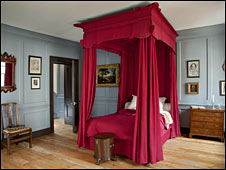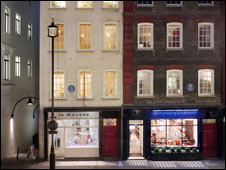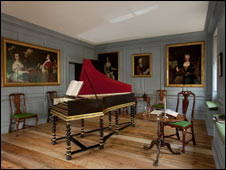Handel's House Museum 音乐大师亨德尔博物馆
Handel House Museum 音乐大师亨德尔博物馆
The script of this programme 本节目台词
收听与下载
42 operas, just over 30 oratorios as well,
Helen: 42 部歌剧 operas,30 部大型音乐作品 oratorios
Along with instrumental music, shorter cantatas, small vocal pieces, harpsichord suites, concerti grossi.
Helen: 器乐演奏 instrumental music, 短篇清唱套曲 shorter cantatas, 大键琴组曲 harpsichord suites, 大协奏曲 concerti grossi.
Rob: All this music by just one person, so who is this prolific composer?
He was born a German, but died an Englishman.
Martin Wyatt, Deputy Director of the Handel House Museum
Helen: 谁是这个 prolific composer 多产作曲家?猜不出来?Here is another hint.
Well he was born in Germany, but in 1727, he did become a naturalised Englishman. So he was born a German, but died an Englishman.
Helen: 生于18 世纪,在德国出生,但后来又加入英国国籍。
Rob: It can't be any other but George Fredric Handel.
Helen: 我们今天的主题人物就是作曲家乔治·弗里德里希·亨德尔 Handel.
Rob: Today we hope to find out more about his life and music at the Handel House Museum.
Helen: 大家好我是 Helen. 那么让我们走进位于伦敦中心的亨德尔博物馆,听听副馆长 Martin Wyatt 的介绍。
The House was built in 1721 and Handel moved in here in 1723, he was the first occupant of the house. And he lived then here for 36 years, upto his death in 1759.

Has Handel just stepped out of the room?
Helen: Handel 在这幢典型的18世纪排房屋里生活了36年,直到他1759年去世。
The feel that we want to give is really is that this is Handel's house, as he had lived in it.
Almost as though you step in to the room, as though Handel has just stepped out of the room. You've just missed him.
Rob: What Martin says is that the museum wants to give visitors the feel that they are visiting Handel's home.
Helen: 走进 Handel 的家,好像感觉他刚刚才离开。Almost as though we stepped into the room, and Handel has just stepped out of the room.
Rob: Well, we've just missed him.
Helen: 我们就差一点点儿就碰上他了。 Handel 一生中的音乐风格有不少的变化,他的与众不同之处是什么呢? 请听 Martin 的介绍。
He combined the tradition of German church music, with the tradition of Italian operas and great choral tradition that he found in England.
Martin Wyatt, Martin Wyatt, Deputy Director of the Handel House Museum
Rob: See if you can hear the three countries that influenced his music.
The oratorios he wrote towards the end of his life, these large musical works, he combined the tradition of German church music, with the tradition of Italian opera, structures of Italian opera, and great choral tradition that he found in England, and really for the first time, brought all those traditions together, and created what is essentially an entirely different musical, a new musical form.
Helen: Handel 从他的家乡德国受到了传统教堂音乐的熏陶 church music. 然后他又去了意大利学习了 Italian Opera 歌剧,后来他定居英国,又发现了合唱团音乐 choral tradition.
Rob: And what Handel did was to bring all these different musical styles together, he created oratorios that are essentially an entirely new musical form.

Inside the Handel's house.
Helen: Handel 把三个国家的音乐风格都融为一体,体现在他后半生的作品中,oratorios 大型音乐作品。这完全是他的创新。
Rob: He was well respected and almost had a celebrity status in his day. Interestingly, like many musicians, he was talented in language as well.
There are some great anecdotes about Handel, he obviously had a great sense of humour, and a lot of the anecdotes that have come down to us, kind of displayed this humour.
Helen: Handel 很幽默,he had a great sense of humour.
But I understand he was fluent in English, French and Italian, and he needed all of those in the worlds in which he lived, and of course his native language of German.
And one of the stories that's most often told about him was that he was able to swear in six or seven languages all at the same time and often in the same sentence.
Helen: Handel 精通最少4种语言。

Handel House Museum
Rob: And one of the anecdotes is that he was able to swear in six or seven language and often in the same sentence.
Helen: Handel 的过人之处是能用6或7种语言骂人, swear 就是说脏话,而且是在同一个句子里。
Rob: That is pretty impressive; sadly recording equipment didn't exist then to capture his language talent.
Helen: Well, we are privileged to have his music heritage preserved for us. 在 Handel House 博物馆中我们能感受到他的精神和音乐。
Rob: In the intimate surrounding of the house, visitors are often treated to performances from real musicians.
Helen: 说不定能激发起我们内在的音乐潜力成为下一个 Handel。谢谢收听。
Rob: Bye.